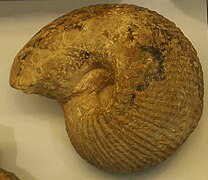Macrocephalites: Difference between revisions
No edit summary |
Brygmo5446 (talk | contribs) No edit summary |
||
| Line 15: | Line 15: | ||
}} |
}} |
||
'''''Macrocephalites''''' is a genus of the [[Stephanoceratoidea|stephanoceratoid]] [[Ammonitida|ammonite]] family [[Macrocephalitidae]], diagnostic of the [[Callovian]] stage of the Middle [[Jurassic]]. Three subgenera, ''Dolikephalites'', ''Kamptokephalites'', and '' |
'''''Macrocephalites''''' is a genus of the [[Stephanoceratoidea|stephanoceratoid]] [[Ammonitida|ammonite]] family [[Macrocephalitidae]], diagnostic of the [[Callovian]] stage of the Middle [[Jurassic]]. Three subgenera, ''Dolikephalites'', ''Kamptokephalites'', and ''Pleurocephalites'' are recognized in addition to ''Macrocephalites'' itself, with ''Indocephalites'' tentatively included as the fourth. |
||
==Diagnosis ''Macrocephalites'' s.s.== |
==Diagnosis ''Macrocephalites'' s.s.== |
||
Revision as of 14:03, 17 March 2020
| Macrocephalites Temporal range:
| |
|---|---|

| |
| Scientific classification | |
| Kingdom: | |
| Phylum: | |
| Class: | |
| Subclass: | |
| Order: | |
| Superfamily: | |
| Family: | |
| Genus: | Macrocephalites Zittel, 1884
|
Macrocephalites is a genus of the stephanoceratoid ammonite family Macrocephalitidae, diagnostic of the Callovian stage of the Middle Jurassic. Three subgenera, Dolikephalites, Kamptokephalites, and Pleurocephalites are recognized in addition to Macrocephalites itself, with Indocephalites tentatively included as the fourth.
Diagnosis Macrocephalites s.s.
Macrocephalites itself has a strongly ribbed, involute, subglobose to discoidal shell with a somewhat small open umbilicus, compressed whorl section, higher than wide, and rounded venter. Early whorls are more strongly ribbed than later, which become smoother, ending with a smooth body chamber. Primary ribs, which emanate radially from the umbilicus, bifurcate and sometimes trifurcate mid flank and cross the venter uninterrupted. Shells grew to be large, even gigantic. Distribution is widespread.
Subgenera
Dolikephalites is similar in general form to Macrocephalites but has fine ribbing that continues to the end and is never large.
Kamptokephalites is more globose than Macrocephalites' proper, with a depressed whorl section, wider than high, broadly arched venter, coarse plicate ribbing and wider umbilicus.
Pleurocephalites also has a broad shell with depressed whorl section and sharp ribbing that continues to the end. Primary ribs on the inner part of the whorls slope dorso-ventrally to the rear.
Indocephalites is broad and coarsely ribbed in early growth stages but becomes smoother and more compressed in the adult.
Gallery
-
Macrocephalites (Dolikephalites) perseverans
-
Subgenus Kamptokephalites
-
Macrocephalites diadematus
References
- ^ Sepkoski, Jack (2002). "A compendium of fossil marine animal genera (Cephalopoda entry)". Bulletins of American Paleontology. 363: 1–560. Retrieved 2017-10-18.
- Arkell et al. 1957. Mesozoic Ammonoidea. Treatise on Invertebrate Paleontology, Part L. Geological Society of America and Univ of Kansas Press, R.C. Moore (ed)
- Macrocephalites verus Buckman 1922, illustrated.
- Macrocephalites (Kamptokephalites) aff. cossmani Petitclerc 1915, illustrated.



